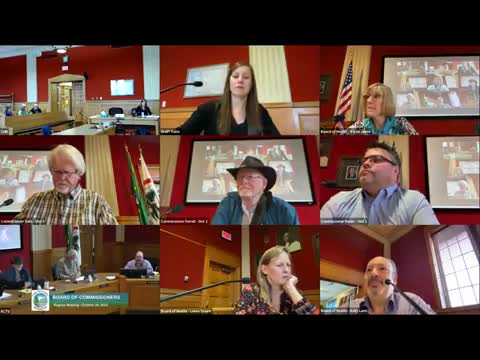Cowlitz County HHS outlines complaint-driven process for solid-waste hazards, emphasizes voluntary cleanup
October 28, 2025 | Cowlitz County, Washington
This article was created by AI summarizing key points discussed. AI makes mistakes, so for full details and context, please refer to the video of the full meeting. Please report any errors so we can fix them. Report an error »

Gina James, a Health and Human Services presenter, told the Cowlitz County Board of Health the department's solid-waste work is complaint-driven and anchored to public-health risk. "We are not driving around looking for solid waste issues," she said, adding that complaints arrive by phone, email, an online form or at the counter.
James said the first step after intake is verification, usually a drive-by from the public roadway to photograph conditions and assess whether debris poses a public-health hazard such as vector habitat, exposed leaking materials or other sanitation risks. "We're looking for that public health risk piece," she said.
When staff verify a public-health hazard, HHS contacts property owners to discuss concerns and set goals for cleanup. James described a common pattern of voluntary compliance: staff monitor progress, return for site visits and confirm specific cleanup milestones before closing the complaint. "Most often, what we see is voluntary compliance," she said.
If voluntary measures do not produce acceptable progress, HHS can escalate to citations. Carol Harrison of Health and Human Services explained the department no longer issues citations directly; the sheriff's office assists and the courts handle the citation process. "We actually used to, but we don't any longer," Harrison said, noting a deputy whose salary the county partially funds helps process those enforcement actions.
James showed before-and-after photos provided by the sheriff's office illustrating yards and lots cleared of tires, appliances and household debris after HHS intervention and owner cleanup. She emphasized that vehicles, motor homes or other items on private property are not automatically a solid-waste violation; officials assess condition, leaks or attendant garbage to determine risk. "Having a vehicle on your property is not necessarily a solid waste complaint," she said.
Board members asked about jurisdiction on private roads and county roads; James said HHS can document observations visible from public roadways and will work with property owners or neighbors who invite staff on-site. She also described periodic tire-collection events run with Washington State University Extension and the Department of Ecology that provide residents free disposal opportunities.
James said HHS also handles liquid-waste complaints through septic permitting channels but reserved detailed discussion for the permitting program. The presentation closed after a short question-and-answer period in which members raised practical concerns about repeat problems and the difficulty of cleanup when family- or tenant-related circumstances complicate removal.
The presentation did not report any change in code or funding; James referenced the county's solid-waste management code but did not cite a specific chapter or ordinance number during the meeting.
James said the first step after intake is verification, usually a drive-by from the public roadway to photograph conditions and assess whether debris poses a public-health hazard such as vector habitat, exposed leaking materials or other sanitation risks. "We're looking for that public health risk piece," she said.
When staff verify a public-health hazard, HHS contacts property owners to discuss concerns and set goals for cleanup. James described a common pattern of voluntary compliance: staff monitor progress, return for site visits and confirm specific cleanup milestones before closing the complaint. "Most often, what we see is voluntary compliance," she said.
If voluntary measures do not produce acceptable progress, HHS can escalate to citations. Carol Harrison of Health and Human Services explained the department no longer issues citations directly; the sheriff's office assists and the courts handle the citation process. "We actually used to, but we don't any longer," Harrison said, noting a deputy whose salary the county partially funds helps process those enforcement actions.
James showed before-and-after photos provided by the sheriff's office illustrating yards and lots cleared of tires, appliances and household debris after HHS intervention and owner cleanup. She emphasized that vehicles, motor homes or other items on private property are not automatically a solid-waste violation; officials assess condition, leaks or attendant garbage to determine risk. "Having a vehicle on your property is not necessarily a solid waste complaint," she said.
Board members asked about jurisdiction on private roads and county roads; James said HHS can document observations visible from public roadways and will work with property owners or neighbors who invite staff on-site. She also described periodic tire-collection events run with Washington State University Extension and the Department of Ecology that provide residents free disposal opportunities.
James said HHS also handles liquid-waste complaints through septic permitting channels but reserved detailed discussion for the permitting program. The presentation closed after a short question-and-answer period in which members raised practical concerns about repeat problems and the difficulty of cleanup when family- or tenant-related circumstances complicate removal.
The presentation did not report any change in code or funding; James referenced the county's solid-waste management code but did not cite a specific chapter or ordinance number during the meeting.
View full meeting
This article is based on a recent meeting—watch the full video and explore the complete transcript for deeper insights into the discussion.
View full meeting
